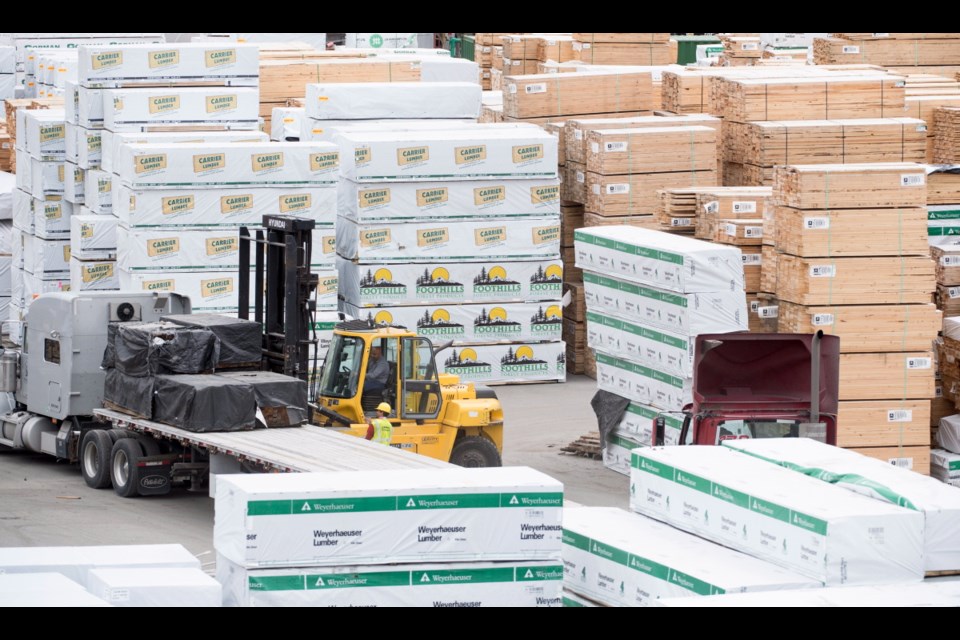The U.S.’s levying of “anti-subsidy” duties on Canadian lumber imports sent a shiver through the coastal forest industry and a tremor through the provincial election campaign Tuesday.
Tariffs of between 3.02 and 24.12 per cent are to be imposed beginning May 1 on five large Canadian producers, and 19.88 per cent for all other firms.
“Certainly we are concerned about it — it means higher lumber prices for the U.S., which could curtail business in Canada,” said Rick Wangler, vice-president of Steelworkers Local 1937, which counts 3,000 Island forest workers among its membership. “This certainly has everybody on edge.”
Wangler said the union has been in contact with Western Forest Products, the Island’s largest lumber producer and forestry employer, and there’s no sense yet of what impact the duties will have.
During the last softwood lumber dispute in 2001, thousands of jobs were lost on the Island and around the province as mills cut back production.
However, the coastal forest industry and the province might be in a better position to weather the storm this time.
Rick Jeffery, president of the Coast Forest Products Association, which represents forest companies, said the industry has taken steps to ensure it can withstand this kind of trade action.
“We have done a bunch of market diversification and invested hundreds of millions in our mills to make them technologically advanced and efficient, [and] we have developed new product lines,” he said. “We are not as reliant on the U.S. market.”
In a recent interview with the Times Colonist, Western Forest Products chief executive Don Demens said the company, which was crippled in the early 2000s by punitive duties, would be able to handle a tariff because of its strong balance sheet, diversified markets and efficient sawmills.
Western employs about 2,000 people and has most of its logging and sorting operations on Vancouver Island, including eight mills.
David Emerson, B.C.’s special trade envoy to the U.S., told reporters it’s impossible to say what impact the dispute will have.
“We are a ways away from seeing a bloodbath in the woods,” he said. “I would say given the fact the lumber market in the U.S. is buoyant, I wouldn’t expect a drastic impact in the next few months.”
Emerson said that could change, and he worries about smaller firms that might not have the cash to pay duties to ship product.
“We are going down a path we have all seen before, and we will have to fight very hard and very aggressively through all legal means.”
The dispute once again has the U.S. industry claiming the Canadian softwood industry is unfairly subsidized and dumps lumber into the U.S. market. As in the past, the Canadian government and lumber industry dispute the charges.
“Ultimately, we in B.C. and most people across the country recognize this is really not about Canadian forest policy — this is simply a pressure tactic by an industry that has never been more profitable than it is today,” Emerson said.
It comes down to the greed of American lumber producers “wanting more on the backs of Canadian companies and Canadian workers and American consumers and homebuilders,” he said. “It’s egregious and terrible, but it is what it is.”
Susan Yurkovich, president of the B.C. Lumber Trade Council, told reporters that American demand for lumber exceeds what the U.S. lumber industry produces. Last year, the U.S. consumed 47 billion board feet of lumber and produced 32 billion.
“With housing and construction starts on the rise, demand is forecast to continue to grow in the years ahead,” she said, adding there is room for the U.S. industry to grow and to allow Canada to supply U.S. customers.
The campaigns of all three major B.C. political parties focused on the dispute Tuesday.
B.C. Liberal Leader Christy Clark pledged to stand up for a softwood-lumber industry that employs more than 60,000 people and supports 140 communities in B.C. “My message to those workers and to their families and those communities is this: We are here for you. We are going to fight for you and we are not going to give up this fight until it is won.”
Clark said B.C. will only accept an agreement with the U.S. that is “good and fair” for workers.
“We know we are in for a fight with the Americans, but we are going to succeed, because Americans want affordable housing, too, and they want construction jobs and that means that they need B.C. lumber,” Clark said. “And also because every time these allegations from the Americans go to an impartial court, they are rejected because the facts are all on Canada’s side.”
NDP Leader John Horgan said he was disappointed by the U.S. decision to impose tariffs. “B.C.’s forest sector is fair and market-based and we will vigorously defend against these unfair tariffs,” he said in a statement. “I am equally disappointed that Christy Clark failed to make getting a deal a priority, and failed to lead British Columbia to a fair resolution on softwood lumber. She has not treated this issue with the urgency it deserves.”
B.C. Green Party Leader Andrew Weaver took a similar tack, criticizing Clark for her inability to avoid the situation.
“The provincial government should have ensured that B.C.’s interests were front and centre on softwood lumber,” he said in a statement. “Sadly, we see today that they have failed. We needed leadership from Christy Clark before the tariffs were imposed, not afterwards.”



